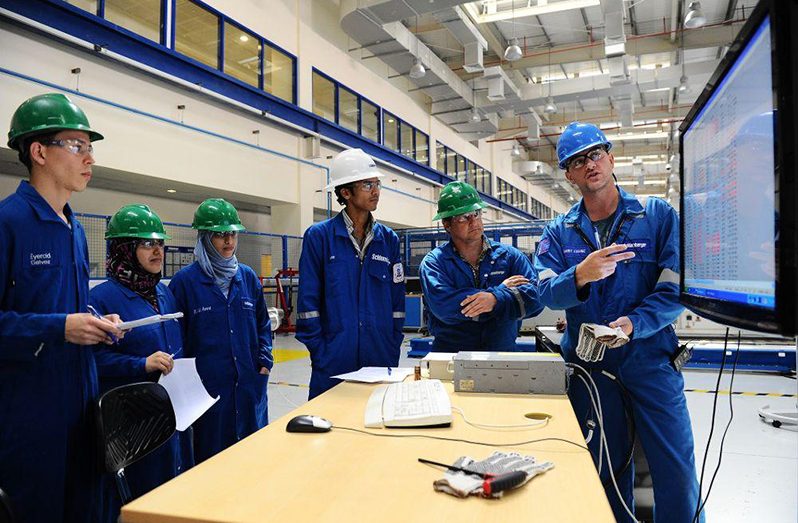By Navendra Seoraj
GUYANA’S fast ascension to the rank of petroleum state has left its human resources under-prepared to service the nascent oil and gas sector, but, as a solution to this problem, the government is planning to establish a world-class petroleum institute and training centre in Guyana.
Several international stakeholders, after recognising that Guyana’s institutional capacity to manage and oversee the oil and gas sector is limited, have encouraged the government to enhance its capacity in order to properly inherit the potential direct and indirect opportunities.
The government, having recognised this shortfall, has started discussions on having a world-class petroleum institute in Guyana, very soon.
“It will not only provide training for Guyanese, but for human resource in the oil and gas sector across the region,” said President, Dr. Irfaan Ali, during his address at the 25th annual award ceremony of the Guyana Manufacturing and Services Association (GMSA), held at State House compound, on Thursday.
The President said this is all part of adjusting the economy to ensure that there is growth from the onset.
Guyanese-owned company, TOTALTEC Oilfield Services, has already announced that it will be injecting US$2.4 million (over G$516 million) into its International Petroleum and Maritime Academy (IPMA) to improve its capacity, amidst Guyana’s growing oil-and-gas sector
TOTALTEC’s IPMA focuses on training Guyanese and teaching skillsets to the candidates so they can develop careers in Guyana’s growing oil-and-gas sector.
Since its establishment two years ago, IPMA has screened over 3,000 applicants, trained over 500 persons and placed over 300 Guyanese in jobs within the petroleum sector.
Critical in the advancement of the petroleum sector is, however, a Local Content Policy, because, while the opportunities will be there, it is left to the investors to hire Guyanese to “do the job”.
Head of the Department of Economics at the University of Guyana, Sydney Armstrong, has been one advocate for local content to be on the front burner of every investment made in Guyana.
“What you find is, generally, in countries which have discovered oil and gas, you would see a lot of businesses coming to their doorsteps… oil and gas is a lot of money and businesses are going to try to get in on that money,” said Armstrong during a recent interview with the Guyana Chronicle.
But Guyana, unlike other countries, has other lucrative resources like land, minerals, fresh water and other things which are very attractive to investors.
So, as Guyana prepares to absorb those opportunities and attention, Armstrong advises that the country must develop a local content policy, to serve as not just a safeguard, but as a conduit for persons to capitalise on the potential opportunities.
“The local content policy needs to specify in terms of components of labour, especially when we talk about massive hotels… Guyanese must be able to benefit from the construction process and also be a part of not just lower levels of the general operations, but also be managers, supervisors and so on,” said the economist.
The government, in September, had established an advisory panel on local content. The panel was tasked with undertaking a review of all existing initiatives and policies relating to local content in the petroleum sector and to provide guidance for the development of Guyana’s Local Content Policy and Legislation.
The panel comprises Shyam Nokta (chair), Carl Greenidge, Anthony Paul, Kevin Ramnarine, Carvil Duncan and Floyd Haynes.
The team handed over its report to the Minister of Natural Resources, Vickram Bharrat, on Tuesday. The policy, once ratified, will pave the way for an inclusive environment, amidst increasing foreign investment and interest in Guyana.
A local content policy, in addition to outlining the measures for direct benefits, must also establish grounds for Guyanese to capitalise on the spill-off benefits.
In Armstrong’s view, they must be able to supply food, water, and other locally produced items which will be on demand based on the operations of the hotels. This is needed especially because of Guyana’s high rate of unemployment.




.png)









